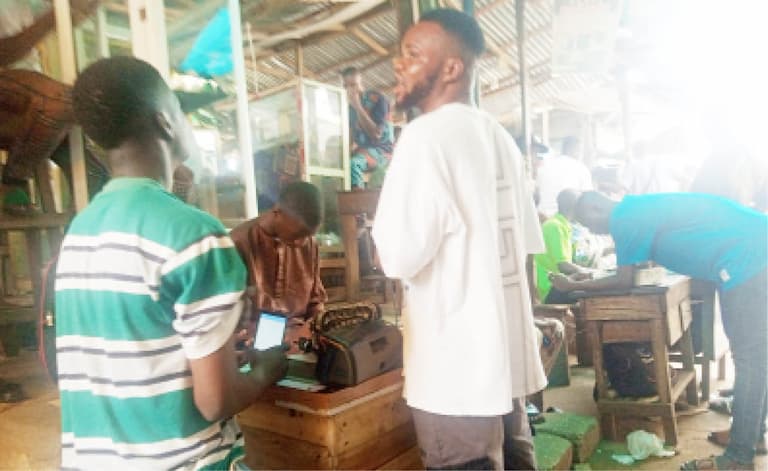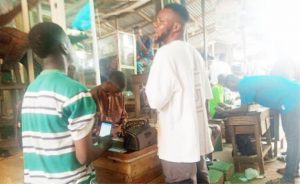
Despite the ongoing nationwide industrial action by the Academic Staff Union of Universities (ASUU), many students are still in hostels across universities in the country. Universities still having students staying back on compus include the University of Ibadan and Ladoke Akintola University of Technology, Ogbomosho and some others.
Our correspondent who visited the two campuses reports that it is very hard for anyone visiting Awolowo, Independence and Queen Elizabeth halls of residence in the University of Ibadan (UI) to believe that ASUU is currently on strike.
Other halls are also busy, while business centres are thriving in the University of Ibadan.
A 300-level student of Economics in the university, Tade Olaitan, said going back to his parents’ home during the strike was tantamount to laziness and lack of seriousness.
“If I go back home, then I am lazy and unserious. I am learning tailoring here. Although my parents may not like it, it is the best for me. However, some students are hiding in the hostels to transact some businesses we cannot mention on the pages of newspapers; but it is not all of us.
“I call on the federal government and the ASUU to resolve the ongoing strike for the interest of all,” he said.
Our correspondent who visited Ladoke Akintola University, Ogbomosho reports that many students are on campus despite the ongoing strike.
A student, Lasisi Oluwakemi, said many of them were on campus because of the convocation that was held recently.
“Many students are on campus because of the convocation we had last week. Some parents also prefer to send money to their children in school rather than coming home. Many houses are not better than school for some of the students,” she said.
In the University of Lagos (UNILAG), findings revealed that students were made to vacate the hostels ahead of the 26th edition of the Nigerian University Games (NUGA) hosted by the school from March 16 to 26.
Although some students had remained in their hostels even after ASUU announced the commencement of a strike action on February 14, because of the NUGA games, they were asked to vacate the hostels to provide accommodation for visitors on campus during the competition.
A staff of the university told Daily Trust on Sunday that the students were not allowed to go back to the hostels after the sports competition.
However, some of the students who reside off campus have refused to go home as they have resorted to acquiring skills that can be of help to them in life.
Academic activities are ongoing at the Lagos State University (LASU) as the university did not join the ASUU strike.
An educationist, Falola Sunday, said it was a display of negligence for parents to allow their children remain on various campuses when lecturers are on strike.
“Many parents have failed in their duties. Why must you allow your children to stay where you cannot see them? That is one of the reasons we are having more internet fraudsters than students in our higher institutions. Ladies are now living a couple’s life in school because they know there are no parents to challenge them.
“The only solution is for parents to maintain their stand on taking care of their children. Every parent must ensure that their children and wards are under their watch,” he said
Kano
In Bayero University, Kano (BUK), there are multiple reasons why students hang around. Although students vacated the university’s dormitories following a notice released by the Students’ Affairs Division of the university, many of the students take shelter in the students’ private residences off campus and relatives’ residences in Kano city.
Ebenezer Oloranwa, a 200-level student in the Department of History, said the strike was quite painful, adding that he had remained in his rented room at the Danbare Students’ Residential Area “to engage in one or two economic activities.” He said he found it unnecessary to go back home.
“I am already an off-campus student, so I don’t have to travel. I am from Ogun State, which is far from here, so I decided to stay. I do one or two things here, actually. I use my computer to render services to people, like typing and graphic/web designing. I do it privately and clients reach out to me through phone, email, etc. The environment is very okay; there is no distraction as people are not many. I concentrate on my work,” he said.
For Oloranwa, staying in faraway Kano means being independent. He added that the strike had given him the opportunity to utilise his time to help himself. Although he misses his parents, he argued that “they are not concerned because I am an adult and I am doing something productive here. I am being independent.”
Muhammad Auwal, a level 2 MBBS student, said he usually went to the campus to read whenever he had the chance. He noted that he stayed close to the campus to assist his uncle in a project.
“I am not here because I am waiting for the ASUU to call off the strike. Getting updates on the strike wouldn’t be difficult for me because I have our class WhatsApp platform. I can also call classmates to get that. I am here for a particular project that is entirely different from academic stuff, but I do come to the campus occasionally to read and revise my notes so that I can keep myself busy and updated. I stay off-campus with a relative,” he said.
He acknowledged that although he is away from his town in Tudun Wada Local Government Area of Kano State, his parents are at ease because they know he lives with an uncle.
“There is no pressure from my parents because they already know the circumstance. Since his house is close to the university, I do help him some days, and I visit the campus to read some other days,” he said.
Habib Adam, whose state of origin is Bauchi, said he remained in Kano to pursue some economic activities to make ends meet.
“I had already paid my house rent before the strike; and there are some opportunities here to pursue, that is why I have remained off campus, from where I do a few things in town”, a year four student of the school said.
Port Harcourt
Chizoba Martins, a final year student of Accountancy in one of the universities in Port Harcourt, Rivers State, who stays in one of the highbrow areas, said she had spent greater part of her days off campus since she gained admission into the university four years ago.
She prefers staying back during ASUU strikes because the university environment enables her to concentrate on her studies, even as she socialises with fellow students, especially those she may not have the opportunity to see during normal vacation.
“I prefer the school environment to my family house. In the house there are lots of distraction from parents and siblings. The university environment affords me the opportunity to interact and relate with fellow students, who I may not be privileged to see when the school is on vacation. The academic calendar of our universities is usually disrupted during strikes and many students prefer to remain on campus and while away time,” she said.
A student of the University of Port Harcourt who craved anonymity said many students who stay off campus would take advantage of that privilege to remain within the university environment.
The Microbiology undergraduate said many of the students who did not go home during this period of strike were those who stay off campus as school hostels would also be closed anytime the school is on vacation or strike. He added that many students who stayed back during strikes had different motives.
“The prolonged ASSU strike has made many students redundant. Many of them continue to loiter within the university community for reasons best known to them. Many of those that remain in school during strike are off-campus students, and the university authority has no control over students resident off campus. Those inside the campus are not allowed to stay in the hostels, which are under lock and key. Some are in the campus to while away time and stay off from the close monitoring of their parents.
“In the campus, students enjoy lots of freedom; they live their lives without any control and supervision. Some of the students, mostly girls, are also into prostitute. Many of the girls who remain in the campus during strike engage in campus marriage. This category of students rent apartments and cohabitate with their male counterparts. They live together and carry on as husband and wife without the knowledge of their parents.
“A lot of female students are into this. Many of them lie to their parents that they are engaged in extramural classes and academic exercise. Other girls are there to do prostitution. They stay back in the campus to trade their bodies to any willing man. They will not have the opportunity of doing that if they are in their respective homes,” he said.
He also said there were other students who stay back on campus because home would be very boring.
A student of the Rivers State University who simply gave his name as Pontus said, “I prefer staying back in school during strike because campus environment is more lively than home. But many of us who stay back during strike are off-campus students who the university authority has no control over.
“If you are on campus you see many of your friends you can interact with. You should also know that many of the students live in rented apartments off campus. These apartments are the same thing with those rented by parents in their respective homes. Many students you see loitering around the campus when the school are on strike are doing so because they are bored at home.
“Another point is that many of the students come from very far states and cities, and the cost of transporting themselves to and from their respective homes to the campus is very expensive. So students in this category prefer to stay back on campus and wait to see when the strike would be called off.”
The Public Relations Officer of the University of Port Harcourt, Mr Sam Kpanu, said students were not allowed to stay in university hostels during strike; as a result, they are usually served a notice of vacation.
From Jeremiah Oke, Ibadan, Christiana T. Alabi, Lagos, Aminu Adamu Naganye, Kano & Victor Edozie, Port Harcourt


Leave a Reply